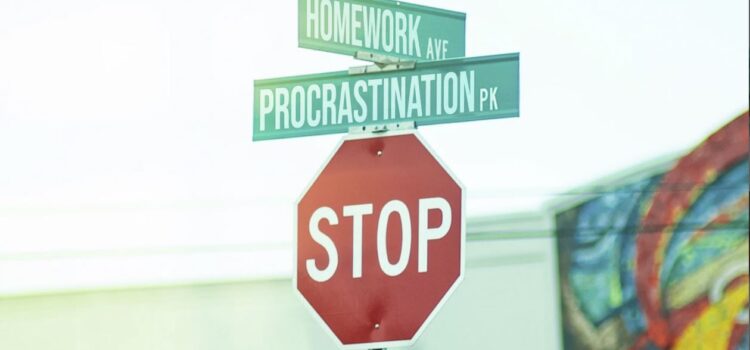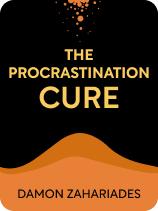

This article is an excerpt from the Shortform book guide to "The Procrastination Cure" by Damon Zahariades. Shortform has the world's best summaries and analyses of books you should be reading.
Like this article? Sign up for a free trial here.
What is procrastination? Is procrastination good or bad?
Surprisingly, some people actually benefit from procrastinating if they work well under pressure. However, Damon Zahariades’s book The Procrastination Cure says that most procrastinators struggle with the habit, and need to stop it.
Below we’ll look at more on if procrastination is beneficial or detrimental to people.
Procrastination Is Delay That Hurts You
Zahariades defines procrastination as delaying action on something that’s in your best interest to do now. He notes that this is more specific than just putting one task off in order to do something else, which can be a strategic choice. He emphasizes that everyone procrastinates—time is limited, and it’s human nature to choose an activity that will bring immediate rewards over one that will bring future satisfaction. Your goal, then, is not to get rid of this tendency, but to gain control over it so that it doesn’t cause problems in your life.
(Shortform note: Other experts, like Jane Burka and Lenora Yuen, define procrastination more broadly—and they say it isn’t always bad. In Procrastination, they say procrastination can be positive, negative, or neutral, depending on the circumstances. Zahariades’s definition matches closely with negative procrastination—when delaying a task has adverse long-term consequences. However, procrastination is positive or neutral when you’re delaying one activity to perform a more important one.)
So is procrastination good or bad? Some people, including Zahariades, believe procrastination is sometimes helpful. They distinguish between passive procrastination, where you delay the important task and instead do something with immediate rewards, and active procrastination, where you delay the important task but choose to do other necessary tasks that are slightly less important but still on your to-do list.
While critics argue that active procrastination is a failure of self-regulation, Zahariades believes it might work well for some people, such as those who thrive under pressure. But he recommends that anyone with a chronic procrastination problem first focus on getting that under control before experimenting with active procrastination.
| Productive Procrastination: Pursue a Useful Project on the Side Inventor and entrepreneur Saul Griffith has shared a technique he calls productive procrastination, which he developed to manage his tendency to procrastinate when the traditional advice hadn’t worked for him. He says he stopped trying to get himself to do what he was supposed to be doing, as long as he was doing something. Activities qualify as “doing something” if they involve your progress or self-development (so distractions like TV and social media are out). Griffith suggests identifying a skill you’re interested in learning and embarking on a fun project that requires you to learn that skill. Then, toggle between doing the tasks you should be doing and working on your side project. Ideally, the skill is something that will serve you well in other contexts in the future, so the time you spend mastering it will not only keep you motivated, but it will pay dividends later on. |
The High Price of Procrastination
As Zahariades points out, you can’t do everything, so every time you do something, it comes at the expense of something else you didn’t do. Procrastination can have immediate consequences when you miss opportunities that require you to act quickly. It can also have longer-term effects that compound when you procrastinate in many areas of your life. For instance, imagine you put off going to the dentist for so long that now you need an emergency root canal, which you try to put on a credit card—except it’s maxed out because you haven’t paid the bill in a while.
Zahariades says he used to be a chronic procrastinator, delaying important things despite negative consequences in all areas of his life. His car was towed repeatedly because he never got around to renewing the registration—other times, he had the new registration sticker sitting on his desk but never put it on his license plate. When Zahariades overcame his tendency to procrastinate, he says he experienced greater success, as well as a sense of purpose and satisfaction.
(Shortform note: Some research suggests the problem of procrastination is intensifying as new technologies make people more susceptible to distraction, interruption, and information overload. And procrastination has costs, not only for the individual suffering from it but also for society as a whole: Some researchers estimate that just the “ding!” sound that alerts you about a new email costs the U.S. economy $70 billion a year because the sound lessens productivity.)
Ranking and prioritizing your tasks might help you better recognize the opportunity costs when you procrastinate. One prioritization tool is the Eisenhower Matrix, developed by US President Dwight Eisenhower. The Eisenhower Matrix suggests categorizing tasks into four zones based on each task’s urgency and importance in helping you progress toward your goals.
- Zone 1: Urgent and important—Handle this task as soon as possible.
- Zone 2: Important, not urgent—Schedule time to handle these tasks, and then stick to that schedule.
- Zone 3: Urgent, not important—These tasks need to be done, but they can be delegated.
- Zone 4: Neither urgent nor important—You can safely ignore these tasks.

———End of Preview———
Like what you just read? Read the rest of the world's best book summary and analysis of Damon Zahariades's "The Procrastination Cure" at Shortform.
Here's what you'll find in our full The Procrastination Cure summary:
- Advice from a former chronic procrastinator on how to stop procrastinating
- How to get to the bottom of what drives you to procrastinate
- How to use lists and schedules to manage your time and tasks






